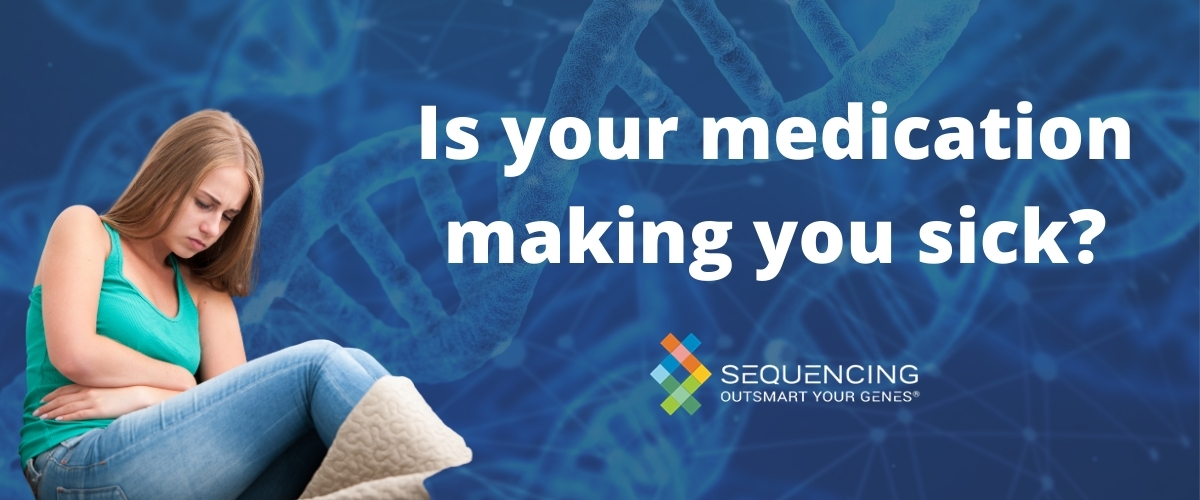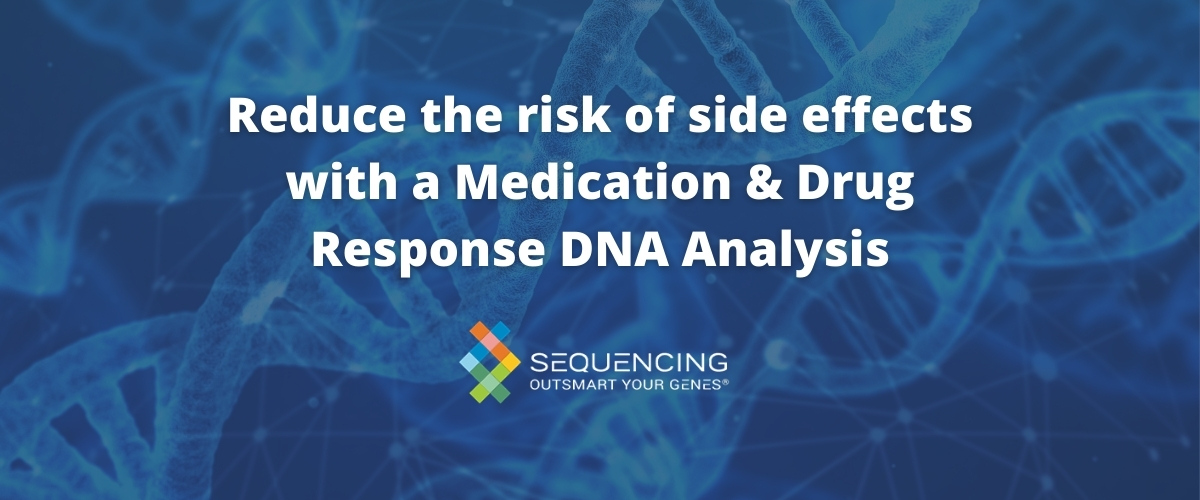
By Dr. Brandon Colby MD, a medical expert specializing in preventive medicine and clinical genomics.
Is Your Medicine Making Your Sick?
We've learned about the effects of medicine on the body as well as how long side effects last but what if you're not feeling well. Could it be a medication you're taking be the cause?
One of the most common questions patients have for their doctors is what to do when medicines have side effects. The answer to this isn't an easy one, and some doctors will simply tell their patients to either deal with them by taking over-the-counter (OTC) medication or stop taking them.
The good news is that those two solutions aren't the only ones when it comes to dealing with side effects. There's actually a way to prevent side effects before they even happen.
When we go to the doctor for treatment, we expect to receive medication that will help us feel better. When that medicine makes us feel worse because side effects compound the symptoms of a medical problem, we become disappointed and frustrated.
Let's take the following common situation:
You go into the doctor's office with a list of symptoms you've been suffering from. The doctor concludes you're dealing with a chronic health problem requiring prescription drugs. There are a number of different ones the doctor can prescribe, so he begins to ask questions about your allergies and medical history. From the process of elimination, he decides on a prescription and off you go home to see what happens.
Now, imagine this:
In addition to answering questions about your allergies and medical history, you hand your doctor a report. This Medication and Drug Response Report identifies medications you can take for your high cholesterol or high blood pressure. These prescription medicines were identified by analyzing your DNA.
Since the medications were identified to work well with your body, you not only find relief from the treatment you receive but you also don't experience any adverse reactions.
When You're Already Suffering from Medication Side Effects
Maybe your situation right now is that you're already dealing with drug side effects. You may have dry mouth, drowsiness, hives, upset stomach, or any of the other common side effects. Hopefully, you aren't dealing with more serious side effects that could be life-threatening such as thoughts of suicide (typical with many antidepressants), anaphylactic reaction (a severe allergic reaction), internal bleeding, etc.). If that's the case, stop what you're doing and contact your health care provider. For those who are experiencing much milder side effects, this is how to reduce side effects of medicines.
Start with over-the-counter medicines. If you have an upset stomach, consider browsing the medication aisle of your local drug store for an antacid or a pain reliever like acetaminophen. You will likely find a medication that will relieve the discomfort. If you don't see anything, ask the store's PharmD for assistance. While you're speaking to him, ask for medical advice on any potential side effects the OTC medicine may have because taking a new drug can cause problems.
Herbal remedies are something that many people think are harmless, but they can lead to adverse events as well. Always check with a healthcare provider when taking any herbal remedies to make sure they don't have drug interactions with your new medication.
Never stop taking prescriptions for a medical condition without first checking with your health care professional. Some prescription drugs need to be titrated down before stopping them or you could end up feeling much worse.
You may want to call or schedule an appointment to meet with your physician to discuss new medicine that may not have as high of a risk of side effects. Again, this would be a good time to show your doctor the report you have that tells him the best medications for you.
The Food and Drug Administration's Role in Side Effects
The United States Food and Drug Administration (FDA) keeps people in the country safe from drugs with potential side effects. Even though all drugs go through clinical trials before they are released to the public, since everyone's body is so unique, it's impossible to catch all possible side effects. That's why they encourage people to report any drug reactions, especially serious ones, to their MedWatch program. If a particular drug is found to cause too many adverse events, the FDA may not approve it for a particular health condition.
You can learn more about the FDA and how they protect people from medication side effects here.
Protecting Yourself from Potential Side Effects

The best way to protect yourself from potential side effects while receiving the treatment you need for a medical condition is to seek genetic testing. With a simple DNA test and a Medication & Drug Response analysis, you can find out which medications will cause side effects so you can avoid them.
If you've already had a DNA test through 23andMe, MyHeritage, Ancestry, FamilyTreeDNA, Dante Labs, or any other DNA testing companies, you can upload the raw DNA data to Sequencing.com and then choose the Medication and Drug Response analysis app. You'll receive a report with the information need as soon as it has finished analyzing your DNA.
For those of you who have not had a DNA test, you can order one right here on Sequencing.com. We have two types of DNA tests (Ultimate Genome Sequencing and Ultimate DNA test) that will analyze your DNA in different ways. You can learn more about the two types of DNA tests available on Sequencing.com here.
About The Author
Dr. Brandon Colby MD is a US physician specializing in the personalized prevention of disease through the use of genomic technologies. He's an expert in genetic testing, genetic analysis, and precision medicine. Dr. Colby is also the Founder of Sequencing.com and the author of Outsmart Your Genes.
Dr. Colby holds an MD from the Mount Sinai School of Medicine, an MBA from Stanford University's Graduate School of Business, and a degree in Genetics with Honors from the University of Michigan. He is an Affiliate Specialist of the American College of Medical Genetics and Genomics (ACMG), an Associate of the American College of Preventive Medicine (ACPM), and a member of the National Society of Genetic Counselors (NSGC).